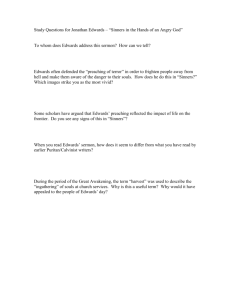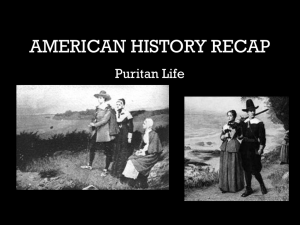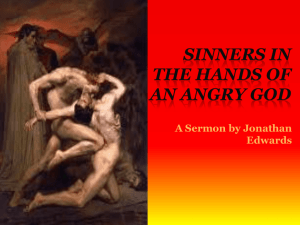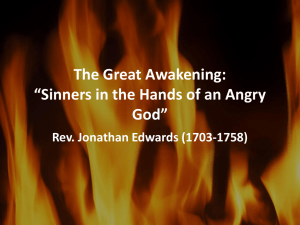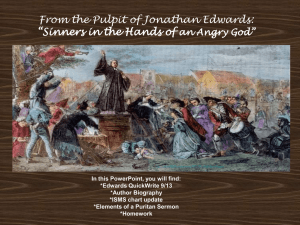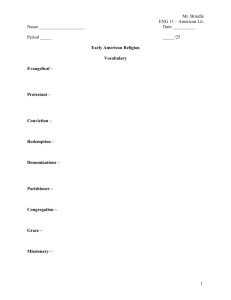Jonathan Edwards, Sinners in the Hands of an Angry God
advertisement
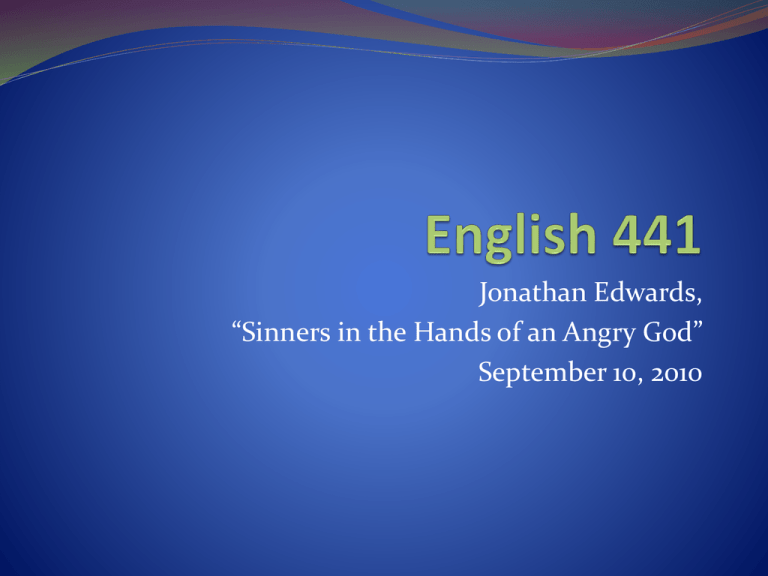
Jonathan Edwards, “Sinners in the Hands of an Angry God” September 10, 2010 AMERICAN LITERATURE: 1700-1820 The changing face of America Population of the colonies increases exponentially 1670: 111,000 1700: 250,00 1760: 1.6 million 1700-1720: Boston doubles in size. Immigration ~1700-~1750: An influx of Dutch, Germans, French Protestants, and Jewish merchants. Compared to Europe, the colonies were cheaper and healthier places to live. Slavery begins to quicken its pace. Many Native American Indian tribes begin to disappear. AMERICAN LITERATURE: 1700-1820 The Enlightenment in America Cotton Mather’s death in 1728 symbolically marks the end of Puritanism as the first colonists knew it. Isaac Newton (1642-1727) revealed through the laws of physics some basic concepts of the universe, proving that the human mind, without the aid of God, can understand the universe in new ways. John Locke (1632-1704) postulated that human sympathy, rather than supernatural grace, could serve as the basis for a moral life: reliance on human sympathy could be the catalyst for moral choice and individuals could control their own spiritual destinies. The Enlightenment was a reaction against the authority and irrationality established churches. William Bradford’s and John Winthrop’s allegorical reading of the world (seeing every natural and human event as a message from God) seemed outdated, quaint. More and more, Christianity was depicted as a tool of tyrants and oppressors, and it was seen as hostile to the development of reason and the progress of science and incapable of verification. THE EMERGENCE OF AMERICAN EVANGELICALISM: THE GREAT AWAKENING The first generation of New England Puritans required that church members undergo a conversion experience that they could describe publicly. Their successors were not as successful in reaping harvests of redeemed souls. Beginning in the 1730s, mass open-air revivals overseen by powerful preachers like George Whitefield brought thousands of souls to the new birth, called The Great Awakening. While this movement had spent its force in New England by the late 1740s, these ministers carried the Great Awakening into the southern colonies, igniting a series of the revivals that lasted well into the nineteenth century. Jonathan Edwards (1703-1717) The most important American preacher during the Great Awakening. Ironically, Edwards credits John Locke for confirming his conviction that believers must not only comprehend religious ideas, but also that they must be moved by them: “The difference is like the difference between reading the word fire and actually being burned.” A revival in his church in Northampton, Massachusetts, in 1734 was considered a harbinger of the Great Awakening Edwards was more than an effective evangelical preacher, however. He was the principal intellectual interpreter of, and apologist for, the Great Awakening. He wrote analytical descriptions of the revival, placing it in a larger theological context. Edwards was a world-class theologian, writing some of the most original and important treatises ever produced by an American. He died of smallpox in 1758, shortly after becoming president of Princeton. Jonathan Edwards, con’t. Perhaps Jonathan Edward's only writing familiar to most modern audiences, Sinners in the Hands of an Angry God was not representative of his vast theological output, which contains some of the most learned and profound religious works ever written by an American. Like most evangelical preachers during the Great Awakening, Edwards employed the fear of divine punishment to bring his audiences to repentance. However, it is a distortion of his and his colleagues' messages and characters to dismiss them as mere "hellfire" preachers. Don’t forget this: Jonathan Edwards and Benjamin Franklin were contemporaries. The colonists in New England were, at Jonathan Edwards’s time, 120 years removed from the Pilgrims’ landing at Plymouth Rock. These 120 years had dulled the horror and pain of the Pilgrims’ destitute handto-mouth existence, and all that remained was a picture of a lost golden age where simple family values and an unquestioning faith in God allowed the pilgrims to succeed (Clearly, no one was reading Bradford’s “Of Plymouth Plantation” or they would have heeded his warnings). What was stirring, striking, or memorable to you in reading this sermon? What does it mean to be unconverted? What images or analogies does Edwards use to evoke the situation of the unconverted? What are the most prominent themes communicated by these images? What is the purpose of his sermon? How are listeners meant to feel? How are people meant to respond to his sermon? Rhetorically Speaking Edwards takes a verse from Deuteronomy as the basis for this sermon: “Their foot shall slide in due time” (32.35). He then interprets it as “There is nothing that keeps wicked men at any one moment out of hell but the mere pleasure of God.” How would you characterize God in Edwards’s sermon? How does this sermon work? What makes it effective? 1. How does his use of language in the "Application" section of the sermon differ from and comment on the earlier “doctrinal” section? 2. Jonathan Edwards is considered the last great Puritan because of his efforts to revive a dying theology. Discuss the important arguments contained in “Sinners.” 3. How does “Sinners” compare in form and function to Edward Taylor's poems? Works Cited Religion in 18th Century America http://www.loc.gov/exhibits/religion/rel02.html The Norton Anthology of American Literature, 7th ed.
